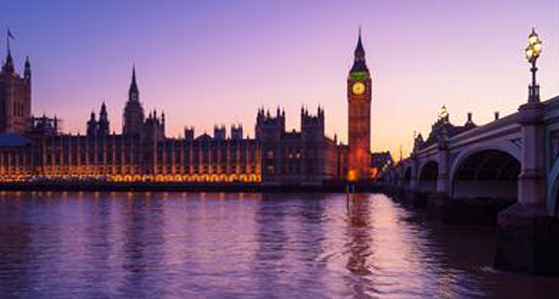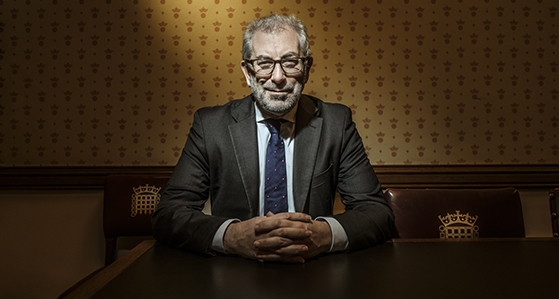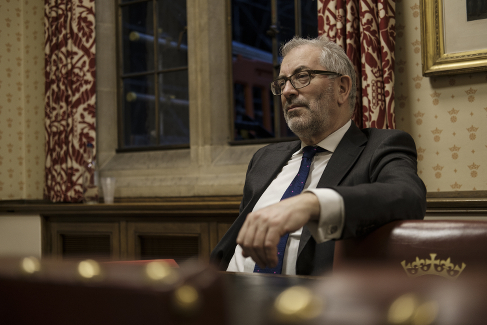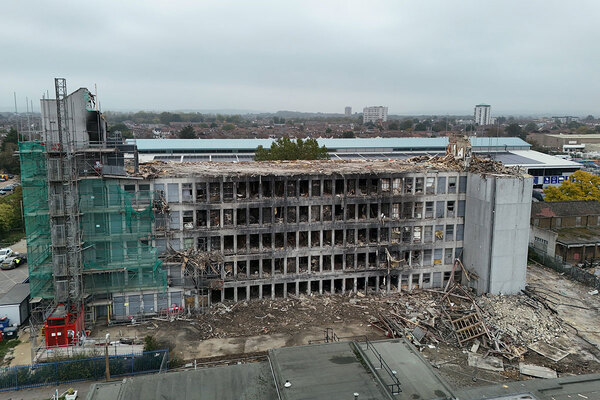You are viewing 1 of your 1 free articles
The battle of the Lords
Lord Kerslake used to head up the civil service. Now he’s fighting from the outside to alter legislation he thinks could “eliminate” social housing. Martin Hilditch finds out why he’s worried.
Video:
features code

Little more than a year ago, Lord Kerslake sat right at the heart of government in his role as head of the civil service.
“My strong view is that the government policies will ultimately lead to the diminishment and maybe the end of social rented housing.”
Today, elevated to the House of Lords following his retirement (he was plain old Sir Bob back in his civil service days), he is still making his presence felt. Indeed, he has revealed himself to be a tireless champion of affordable housing, forging his reputation as an outspoken critic of aspects of the Housing and Planning Bill which is currently passing through the House of Lords.
Inside Housing has come to the House of Lords to meet Lord Kerslake and discuss the peers’ concerns about this bill - as well as tactics they are likely to use to push for change. We begin with a hunt for the booked meeting room for the interview - Lord Kerslake is yet to memorise all of these corridors of power.
Video:
Ad slot
A week before we meet, Inside Housing revealed that the peers have become so frustrated at the lack of information available about some aspects of the bill - such as the thresholds at which councils will be forced to sell high-value council homes - that they are considering issuing a rarely-used amendment known as a ‘sunrise clause’ to force the government’s hand. The clause would require the government to seek full parliamentary approval for the details that currently look set to be determined at a later date, which would mean the Lords could then subject them to proper scrutiny. The peers are revolting and Lord Kerslake is speaking out because he feels the bill as it stands will have a devastating impact.

“My strong view is that the government policies as they are constructed at the moment will ultimately lead to the diminishment and maybe the end of social rented housing,” he states. “I think that is ultimately where you end up, with it being if not eliminated then eliminated from parts of the country - and a completely residual option for those who are in the most extreme levels of need.”
Straight talking
“There are resonances with the whole Iain Duncan Smith debate.”
It’s still something of a surprise to hear Lord Kerslake speak so directly - although he’s been getting plenty of practice of late. Before his retirement, of course, he played a resolutely straight bat while heading up the civil service. His quietly spoken approach in a committee meeting led Daily Mail columnist Quentin Letts to refer to him as a “meek mouse” back in 2012.
That’s certainly not the case today. When asked what one aspect of the Housing and Planning Bill he would change if he could, he jumps straight in with the forced sale of high-value council homes to pay for the extension of the Right to Buy to housing association tenants.
“I think that is deeply wrong,” he states. He says it is “fair enough” if government decides to focus its resources on helping people into homeownership but not to do it “at the expense of those who might access social rented properties”.

We meet just days after Iain Duncan Smith’s shock resignation as work and pensions secretary, in which he cited concerns about the fairness of the government approach to welfare, raising questions about whether the poorest in society were bearing too much of the strain.
Lord Kerslake feels the same criticism could be levelled at the Housing and Planning Bill. “There are resonances with the whole Iain Duncan Smith debate,” he says. “The people who will be the beneficiaries of the policy [to sell off high-value council homes] will be those who have the wherewithal to buy. They will basically be those who are more financially capable.”
Lord Kerslake then jumps straight into a critique of the bill’s plans to remove long-term secure tenancies in social housing, instead introducing mandatory two to five-year fixed terms (and if he got a chance to remove or alter a second part of the bill, this would be it).
“There is a fundamental issue here which I think has been lost sight of,” he states. “This is a person’s home. They need to be able to put down roots and start a family, or if they have got a family put their family into school.”
This is clearly an issue that has some personal resonance for him, and is certainly the area in which his voice becomes most passionate.
“I just think about my wife. Her family were in private rented accommodation [when she was growing up] and she would describe - as many people who get their first social rented property - this was a point almost at which their lives started. It was the point at which they genuinely felt they had a secure base in which to take forward their lives. It was an immensely important moment to them. We are risking depriving others of that moment.”
Peers are currently deciding how best to approach this issue, he states. One of the options, which was talked about during the committee stage, was trying to knock out the clause completely and move back to permanent tenancies. Another option might be pushing for 10-year tenancies rather than five years.

Given how passionately he feels about these issues, if Lord Kerslake were heading the civil service today, would he feel like doing a Duncan Smith and tendering his resignation?
“That is a hypothetical question,” he responds. “I’m pleased not to have to answer that. You can form your own conclusions on that one I think.”
He’s certainly putting huge amounts of time into scrutinising the bill - despite peers worrying that “they can’t do their job properly” because there are so many missing details, such as how the extension of the Right to Buy will work and how forced council sales will work. Clearly this is the reason why peers are thinking so seriously about using a ‘sunrise clause’.
It isn’t just the House of Lords keeping Lord Kerslake busy, of course. He’s also the current president of the Local Government Association (LGA) and chair of housing association Peabody.
On the face of it, these two roles are something of a tricky balance, given that the LGA criticised the National Housing Federation’s voluntary deal with government to extend the Right to Buy to housing associations last year - which Peabody signed up to.
Forced sell-off
“The housing association sector can do more on the supply issue.”
Lord Kerslake is clear that he thinks criticism of the deal is unfair, because the government may well have forced through a worse deal instead and “the sector had to think, did it want to be in opposition to government for five years and maybe longer?”. Nonetheless he understands councils’ anger about the forced sell-off. “They are in my view the real losers out of this bill.”
Has the deal affected council relationships with housing associations?
“Most definitely yes,” Lord Kerslake acknowledges, before stressing that it is a mixed picture.
“I went to a local authority to do a scrutiny session with their councillors,” Lord Kerslake states. “One of the councillors said to me, ‘Housing associations used to be heroes and now they are zeroes.’ So I am under no illusion that this created issues with some local authorities - not all - and they feel it very intensely.”
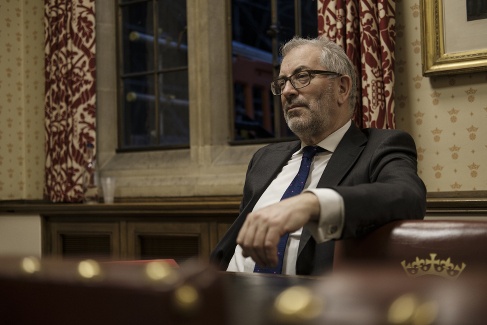
He says he hopes councils won’t let their frustrations get in the way of “what should be a good and positive relationship”. “We can help them deliver affordable rent. We can help them with issues to do with care and keeping people in their homes. We want to be positive partners.”
We also touch briefly on concerns raised days previously in The Times that housing associations aren’t building as many homes collectively as they could. Does Lord Kerslake think there is any truth in this diagnosis?
“How can I put this?” he starts carefully. “The housing association sector can do more on the supply issue. But government has also got to recognise that if it is going to do more, it has got to create the conditions for them to succeed.”
His ultimate answer was: “Create the right environment and then ask more of housing associations.”
With that our time draws to a close at 6.30pm - although for Lord Kerslake the day’s work is just beginning - with a further session of Housing and Planning Bill scrutiny, finishing at midnight.
He may no longer oversee the civil service - but he is clearly determined his influence over housing policy will remain as strong as ever.
Lord Kerslake will chair an interview with the new mayor of London at Housing 2016 on Tuesday 28 June, at 4pm in the Exchange Auditorium

